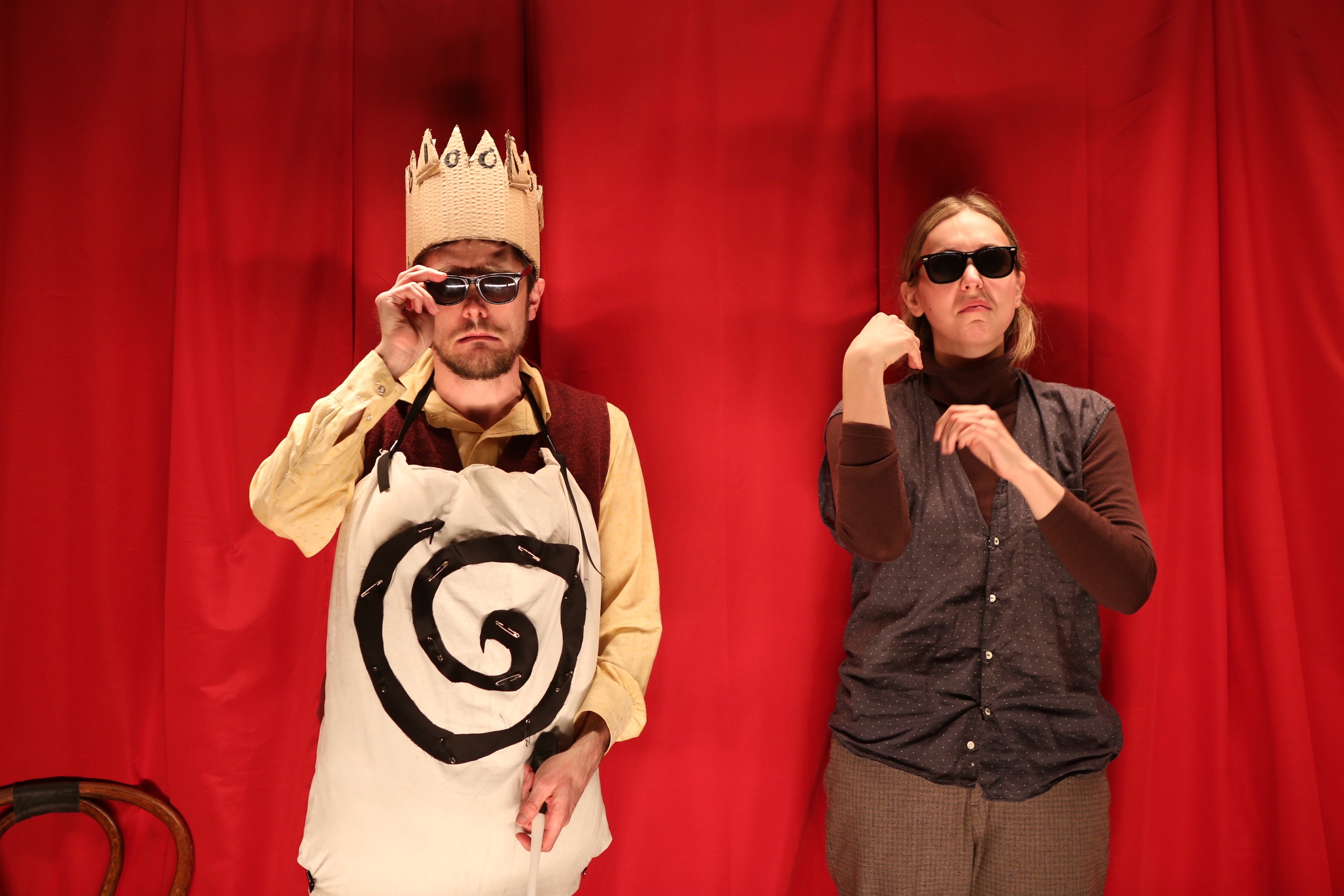You know the drill: one age’s rebellion is another age’s nostalgia act. That’s in popular culture. In the fine arts, it tends to be: one age’s rebellion is another age’s academic assignment. In the pop world, nothing ages as fast as the parental generation’s youth; in the fine arts, it’s all a bit like the nefarious character played by John Huston in Chinatown (1974) says: “Politicians, old buildings, and whores all get respectable if they last long enough.” In the fine arts, it’s academic study that confers respectability. Dada, pataphysics, cubists, Theater of the Absurd, Theatre of Cruelty, the Beats—they’re all in museums and on syllabi. And what gets lost, often, is what made it all so exciting in the first place. Enter The Crazy Shepherds of Rebellion, the show currently playing at the Yale Cabaret, conceived and directed by dramaturgy student David E. Bruin, an effort to stage early works by María Irene Fornés and Edward Albee—darlings of theater and drama coursework—as though Greenwich Village were still inhabited by bohemians and not pop culture elites. We’re not at the Yale Cab, we’re at Café Ubu (named after Alfred Jarry’s comic-absurdist-tragic figure) and, as the dated posters and portraits on the walls of Reid Thompson's set will tell you, it’s around 1962. JFK hasn’t been assassinated yet and the Beatles are still in Liverpool.
It’s to the credit of Bruin and his cast that they play the material—including the introductory bits that include some squabbling about a petition to stop that freeway extension Robert Moses is planning for the Village—straight, without any hint of ‘beatnik’ send-ups. The point is, one quickly gathers, the drama student of today might well be pining for the days before theatrical fellowships and “courses on X”—the days when the likes of Albee and Fornés hung out in collectivities that were already looking back to ad hoc artist congeries like dada and other manifesto-spouting “movements.” Remember when it wasn’t art if you got paid for it? And it wasn’t for a grade either. Hey, kinda like Yale Cabaret . . .
Crazy Shepherds is an instructive and entertaining evening. Plays like Fornés’ The Successful Life of 3 and Albee’s The Sandbox should resist even blackbox staging. These are plays for a cabaret, a café, a living room, almost. Maybe a playground’s actual sandbox (do those still exist?) for the latter. Bruin and company rightly grasp that to do such work justice you have to be willing to go back to its time to see it as it might have been. Historians of the arts have to do this; theater audiences much less, and it’s great to see knowing dramaturgs and others giving it a shot and taking us along with them.
And you certainly get your money’s worth: not only Successful Life and Sandbox, but also a romp through a truncated take on Jarry’s Ubu roi (with a very spirited Ubu from Brendan Pelsue) and a performance piece featuring bits from Part III of Howl. Annelise Lawson, reciting, is the star of the evening as she also plays a man (who imagines himself as Zorro at one point) in Successful Life, Ubu’s queen in Ubu roi, and, very effectively, the old woman in Sandbox, as well as going into electroshock convulsions for the Howl recital (Howl is dedicated to Allen Ginsberg’s fellow inmate at Columbia Psychiatric Institute, Carl Solomon, who did receive electroshock treatment at Rockland State Hospital).
Elsewhere there’s tasteful violin accompaniment by Eli Epstein-Deutsch and atmospheric vocalizing by Jenelle Chu, who also plays the woman in Successful Life, a ditzy symbol of female emptiness—or is that an empty symbol of feminine ditziness—while Lawson and Pelsue (the latter in a mode reminiscent of Dick York on Bewitched) enact an absurdist’s take on “masculine rivalry” (yes, that was once a buzz term). Chu is also a patient “mommy” to Pelsue’s “daddy” as they wait for granny (Lawson) to give up the ghost in Sandbox. The plays by Fornés and Albee both demonstrate the phase of incipient genius, still. And the evening is best if you can forget you’re watching YSD students playing at their grandparents’ rebellion and imagine you’re watching amateur theatricals reinvent theater.
At the end of the evening, a hat is passed, but, rather than pitching in, the audience is asked to extract fortune-cookie-like one-liners. Many in the audience, no doubt, won’t realize the lines are taken from William Blake’s “Proverbs of Hell” (c. 1790, following the French Revolution); “everything old is new again,” as the song says. And some things are so innovative they can never become conventional.
The Crazy Shepherds of Rebellion Conceived and directed by David E. Bruin Featuring: Maria Irene Fornes’ The Successful Life of 3 and Edward Albee’s The Sandbox
Cast: David E. Bruin, Jenelle Chu, Eli Epstein-Deutsch, Annelise Lawson, Brendan Pelsue, Gretchen Wright; Dramaturg: Phillip Howze; Set: Reid Thompson; Lights: Andrew F. Griffin; Composer/Sound: Pornchanok Kanchanabanca; Costumes: Asa Benally; Stage Manager: Will Rucker; Producer: Melissa Zimmerman
Yale Cabaret March 20-22, 2014

